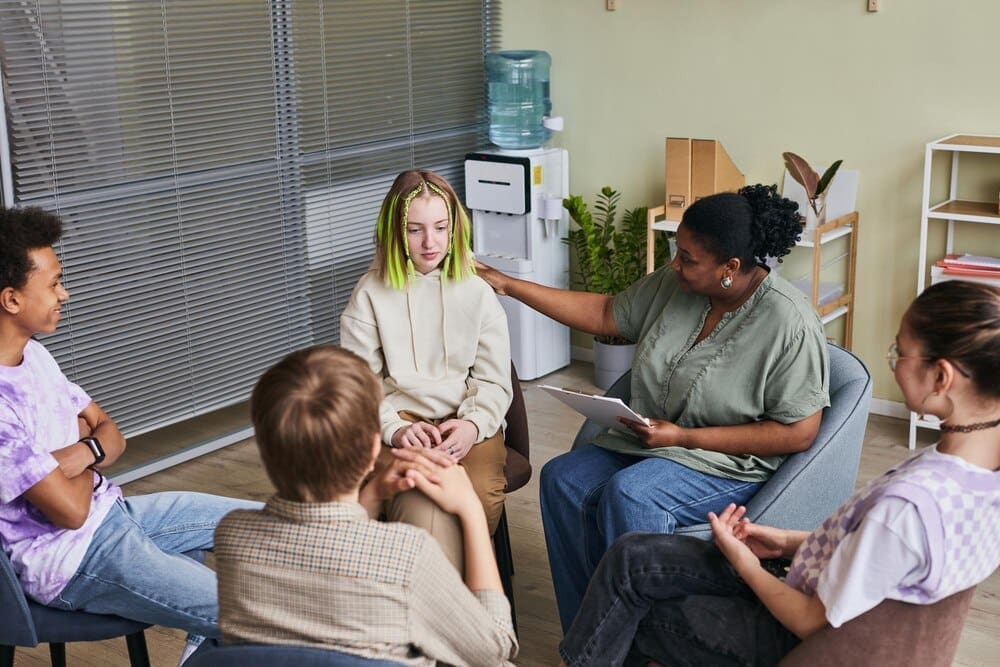Group therapy is a powerful and widely used form of psychotherapy where one or more therapists treat a small group of clients together. It provides a unique environment for individuals struggling with similar issues—from social anxiety and depression to grief and addiction—to connect, share experiences, and learn coping strategies under professional guidance. The core power of this modality lies in its ability to show participants they are not alone in their struggles, fostering a sense of community and mutual support that can be profoundly healing and often more affordable than individual counseling.
What Exactly is Group Therapy?
At its heart, group therapy involves a gathering of typically five to fifteen individuals who meet on a regular basis, usually weekly, for an hour or two. These sessions are led by at least one qualified therapist who acts as a facilitator, guiding the conversation, ensuring a safe and respectful environment, and providing therapeutic interventions.
The group itself is the primary therapeutic agent. Unlike one-on-one therapy where the focus is solely on the individual’s relationship with the therapist, group therapy creates a complex web of relationships. Members interact not only with the therapist but also with each other, creating a dynamic social setting where they can give and receive support, feedback, and encouragement.
Groups can be either open or closed. Open groups allow new members to join at any time, which can be beneficial for ongoing support networks. Closed groups, conversely, are composed of a core set of members who begin and end the therapy together over a set period, which can foster deeper bonds and trust.
The Powerful Advantages of a Group Setting
For many, the benefits of group therapy are substantial and address needs that individual therapy cannot. The shared experience creates a unique environment for growth and healing.
Universality: The Realization You Are Not Alone
One of the most profound benefits, identified by pioneering psychiatrist Irvin D. Yalom, is the concept of universality. Many people entering therapy feel isolated, believing their thoughts, fears, and problems are unique to them. Walking into a room and hearing others articulate the very same struggles can be a powerful and relieving experience. This realization shatters the sense of isolation and shame, creating an immediate and powerful bond among members.
A Laboratory for Social Skills
A therapy group functions as a social microcosm—a safe and supportive space to practice and refine interpersonal skills. For individuals who struggle with social anxiety, assertiveness, or forming healthy relationships, the group is an ideal training ground. You can experiment with new ways of communicating, learn how to handle disagreements constructively, and receive honest, compassionate feedback on how you are perceived by others.
Gaining Diverse Perspectives
In individual therapy, you have one primary perspective: your therapist’s. In a group, you benefit from the wisdom and life experiences of several other people. Hearing how another member successfully navigated a situation similar to yours can provide practical, real-world solutions you may not have considered. This diversity of thought can challenge your assumptions and open your mind to new ways of thinking and behaving.
The Instillation of Hope
Hope is a critical component of recovery. In a group setting, members are at different stages of their healing journey. Seeing others who have faced similar challenges make progress and improve their lives provides tangible evidence that change is possible. This instillation of hope can be a powerful motivator, especially during difficult periods when one’s own progress feels stalled.
Altruism: The Therapeutic Power of Giving
Group therapy is not just about receiving help; it is also about giving it. The act of offering support, encouragement, or insight to another member can significantly boost one’s own self-esteem and sense of purpose. Realizing that you have something valuable to contribute to others’ well-being helps build confidence and shifts the focus away from your own problems, which is in itself a therapeutic process.
Cost-Effectiveness
From a purely practical standpoint, group therapy is almost always more affordable than individual counseling. Because the therapist’s fee is shared among all members, the cost per session is significantly lower. This makes long-term, consistent mental health care accessible to a much wider range of people who might otherwise be unable to afford it.
The Potential Disadvantages and Challenges
Despite its many benefits, group therapy is not the right fit for everyone. It is essential to consider the potential drawbacks and challenges before committing to this form of treatment.
Lack of Individual Attention
The most obvious downside is the divided attention of the therapist. In a one-on-one session, you are the sole focus. In a group, your time to speak is limited, and the therapist must attend to the needs of all members. Individuals who need to process a deep, complex trauma or who are in an acute state of crisis may find that they do not get the focused time they require.
Concerns About Confidentiality
While therapists establish strict rules about confidentiality, they cannot guarantee that all members will abide by them. The fear that a personal story might be shared outside the group is a valid concern and a significant barrier for some. Building trust within the group is crucial, but the risk, however small, always exists because the therapist ultimately cannot control the actions of every member.
Social Discomfort and Anxiety
For individuals with severe social anxiety or extreme shyness, the very idea of sharing intimate thoughts and feelings with a group of strangers can be terrifying. While a skilled therapist can help ease members into the process, the initial hurdle can feel insurmountable for some. The pressure to speak can sometimes be counterproductive if an individual is not ready.
Group Dynamics and Conflict
People are complex, and bringing several personalities together can sometimes lead to friction. A member might monopolize the conversation, personality clashes can occur, or subgroups might form, disrupting the therapeutic cohesion of the group. A skilled facilitator is essential for managing these dynamics, but unhelpful or toxic patterns can still emerge and hinder the group’s effectiveness.
Pacing and Shared Focus
The group moves at its own pace, which may not always align with your individual needs. One week, the session might be dominated by another member’s crisis, leaving little time for your own issues. This can lead to frustration if you feel the group’s progress is too slow or that the topics being discussed are not relevant to your specific goals.
Is Group Therapy Right for You?
Deciding whether to pursue group therapy depends on your personality, your specific goals, and the nature of the issues you are facing. It is often an excellent choice for those looking to improve their interpersonal functioning, work through issues of grief or loss, manage chronic conditions, or address patterns of addiction.
It can be particularly effective when used in conjunction with individual therapy, offering a comprehensive approach that combines deep individual work with real-world social practice. However, if you are in an immediate crisis, dealing with acute trauma that requires intensive processing, or feel deeply uncomfortable with the idea of public sharing, one-on-one therapy may be a better starting point.
Ultimately, the best way to find out is to talk to a mental health professional. They can assess your situation and help you determine whether the unique benefits of a group setting align with your therapeutic needs.
Conclusion
Group therapy stands as a testament to the healing power of human connection. It offers a unique and effective environment where individuals can find support, gain perspective, and practice new skills in a community of peers who truly understand. While it comes with challenges, such as a lack of privacy and potential for conflict, its core benefits—universality, hope, and the opportunity for altruism—make it an invaluable tool in the landscape of mental healthcare. For many, the discovery that they are not alone is the first and most important step on the path to wellness.














